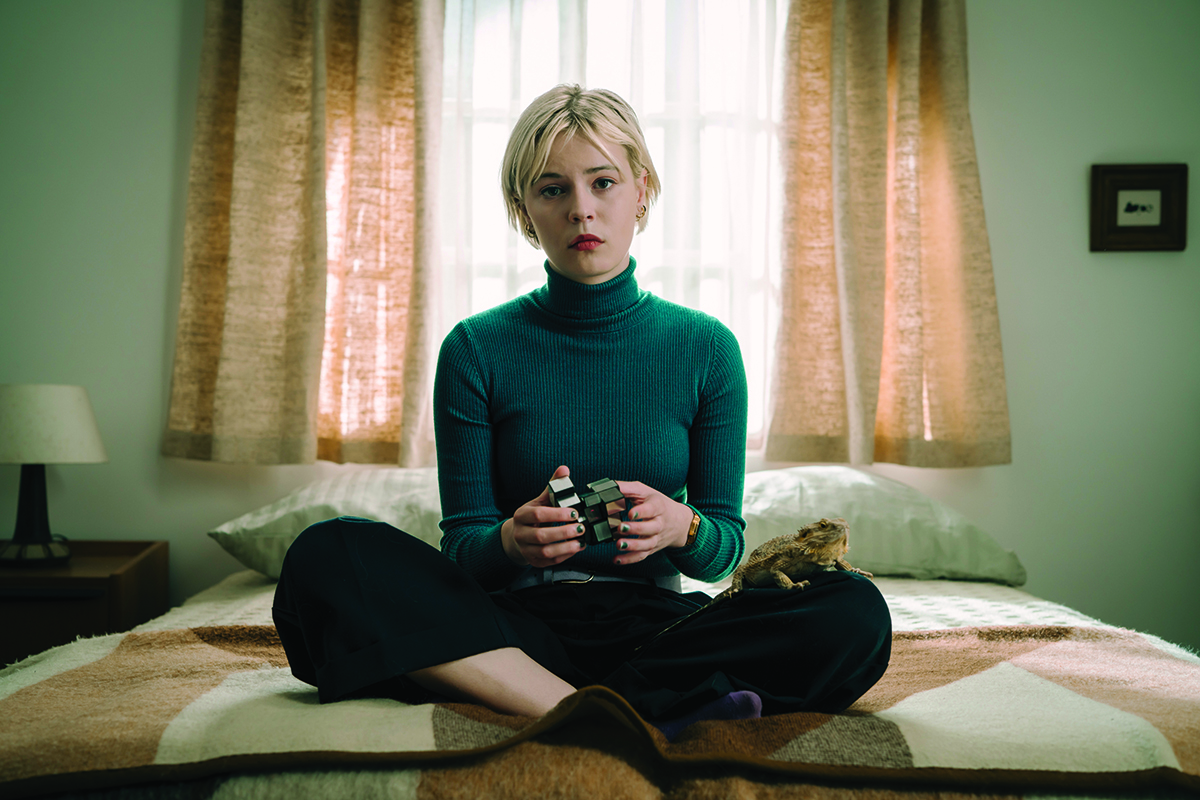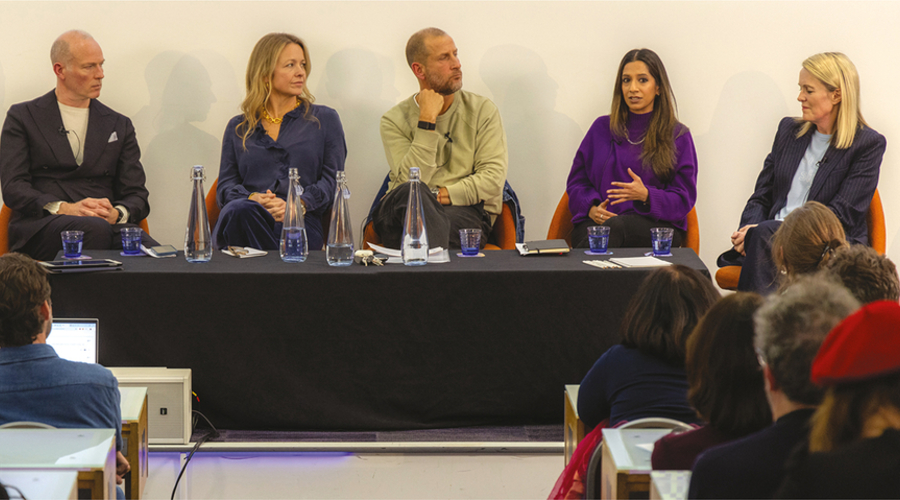Can broadcast fight back? At a sold-out RTS event, industry leaders gave their predictions for the year ahead on this and many more vital questions
Survive till ’25. That was the mantra of the TV industry in 2024, as budgets were squeezed, costs surged, and viewers changed habits. We’ve made it through 2024 – creating national moments with Mr Bates vs The Post Office, The Traitors and the Gavin & Stacey Christmas special. But what happens next?
To assess the landscape, a panel of heavyweight industry leaders assembled in central London for the RTS’s keenly anticipated “2025 TV predictions: an expert view on the year ahead”. There was standing room only as Chair Katie Razzall, BBC News Culture and Media Editor, began the discussion by inviting the panel to look at the advertising market.
Josh Krichefski, CEO of the media investors GroupM for the UK and EMEA and President of the Institute of Practitioners in Advertising, said the overall advertising market was “quite buoyant”. He expected 7% growth this year, with retail and utilities likely to be particularly strong. Inevitably, digital was driving growth, though, he said: “Broadcast is more circumspect, which probably doesn’t surprise you all.”
Krichefski said that weekly reach in broadcast viewing was down 12% year-on-year in 2023, and 6% in 2024. “The decline is slowing, which is a good thing, but the starkest figure is that less than 50% of 16- to 24-year-olds would have tuned in to broadcast TV in an average week.”
With an anticipated 3% decline in broadcast advertising and a 20% increase in streaming advertising, he expected TV advertising to grow between 2 and 3%.
TV advertising is expected to grow between 2% and 3% in 2025
For Amelia Brown, Fremantle UK CEO, shifting patterns in the industry meant that a “process of adjustment is going to continue throughout this year.” While Fremantle remains one of the UK’s biggest independent production companies, creating the likes of The Apprentice and Too Hot to Handle, Brown said: “We are also built on a very old business model. A lot of adjustment has to come from the bigger players to make sure we can move forward. The old business model doesn’t really exist any more, and we’re heading towards multiple new business models.”
In common with other streamers, Prime Video UK introduced unskippable ads last year to its basic package; subscribers can pay an extra £2.99 a month to remove the ads. Reflecting on how this fared, its Managing Director, Chris Bird, said: “We don’t expect any customers to thank us for adding advertising into their programming, but we’ve had a positive response to the way customers have managed the low-level ads, and the ads’ relevance.”
The move has helped Amazon to invest more in content, with the UK production The Rings of Power – “probably the biggest TV show in the world right now”, said Bird – a case in point.
Kiran Nataraja, Director of Streaming and Content Strategy at Channel 4, and Kate Phillips, Director of Unscripted at the BBC, were “cautiously optimistic” about 2025.
Channel 4 was hit hard by the advertising downturn, but it plans to spend more on content in 2025. “Our content budgets aren’t back to the post-pandemic boom, but we’re looking at 2019 levels,” Nataraja said.
That was encouraging for independent producers, as was Phillips’ renewed commitment. “When we commission shows, indies usually keep their intellectual property. That’s important,” she said. “As a public service broadcaster, it’s audience first, but it’s also about supporting the ecosystem in this country. We’re commissioning from as wide a variety of indies as we can.”

Yet in this competitive market, where commissioners and programme-makers battle with one another and other entertainment platforms for eyeballs and revenue, were they in danger of playing it too safe? Phillips said every commission was a gamble. “You can do all the audience research you want, but you still don’t know if it’s going to land,” she said, using recent BBC successes The Traitors and the Gladiators reboot as examples of shows that were not cast-iron hits at the start.
Brown agreed, while acknowledging that “maybe our industry has lost its guts a little bit”, as one breakout hit tends to be followed by a wave of similar pitches. “That’s less on the buyers and more on the developers and us,” she said. “A derivative version is never going to be the next thing to hit big. It never has done, and it never will. Everybody [needs to] trust their gut.”
Programmes need time to grow, said Phillips. “I don’t understand this obsession still with overnight figures,” she added, pointing out that the BBC, Channel 4, and Sweden’s SVT are among those that have shifted away from this metric.
For the streamers, the most desired content in Britain is quality scripted drama that also appeals to a global audience. What’s evolving is collaboration rather than competition with UK broadcasters. Bird said: “For example, we’re co-producing The Night Manager seasons 2 and 3 with the BBC. The BBC will have it in the UK and Amazon will have it internationally. That’s an opportunity, not necessarily a threat or challenge, in the market.”
Something else we are likely to see more of this year is scheduling that complements digital and linear viewing habits and gives rise to what Nataraja called “event moments”. “It’s quite unusual for single episodes of shows [on C4] to play weekly now,” she said. “If we had a four-part crime piece, in the past that would have played over four weeks. Now we schedule Sunday to Wednesday.
"There's a great opportunity for producers who can crack lower-tariff drama"
“It works well because you’re creating a mini-event in the linear schedule, but you’re also creating an instant box set for streaming viewers, so you’re getting the best of both worlds.” Phillips said: “You want people to want more. You want to give them a dopamine hit and then say you’ve got to wait a bit now.”
The panel discussed technological advancements. Fremantle was exploring AI for cost and time savings, but, said Brown: “It will start with a human and end with a human.” The BBC was investigating efficiencies in the production process, too, and looking at AI to curate content for viewers.
A gamechanger in TV advertising is the maturing of addressability, which uses customer data to match ads with the most relevant programmes. “It’s growing significantly, both in terms of viewing and in terms of advertisers doubling down on it,” said Krichefski, whose company is using AI to build addressability models. “It enables ads to deliver a better return on investment, so advertisers will spend more money, which is beneficial to broadcasters and streamers.”
Each panellist was asked to forecast one key trend. Krichefski predicted a significant year for women’s sport, while Nataraja saw opportunity for “producers who can crack lower-tariff drama”. She cited Patience, Channel 4’s high-profile drama, as an example that was at the other end of the scale to The Day of the Jackal, which reputedly cost £10m an episode.
Brown predicted “a live event thatwill surprise us all, but I don’t know what it is yet”. Bird envisioned more crossover between mainstream broadcasters and personalities from social platforms. He said: “YouTube, TikTok, Instagram and so on have created a new generation of talent for their networks. You’ll see many more of those talents transition to big TV and streaming, and successfully so. “Hopefully they will bring in audiences from those environments to our TV services.”
Report by Shilpa Ganatra. The RTS National Event ‘2025 TV predictions: an expert view on the year ahead’ was held at the Cavendish Conference Centre, London on 22 January. It was hosted by Katie Razzall, Culture and Media Editor, BBC News, and produced by Julie McKeen, David Amodio and Nicola Moon.







